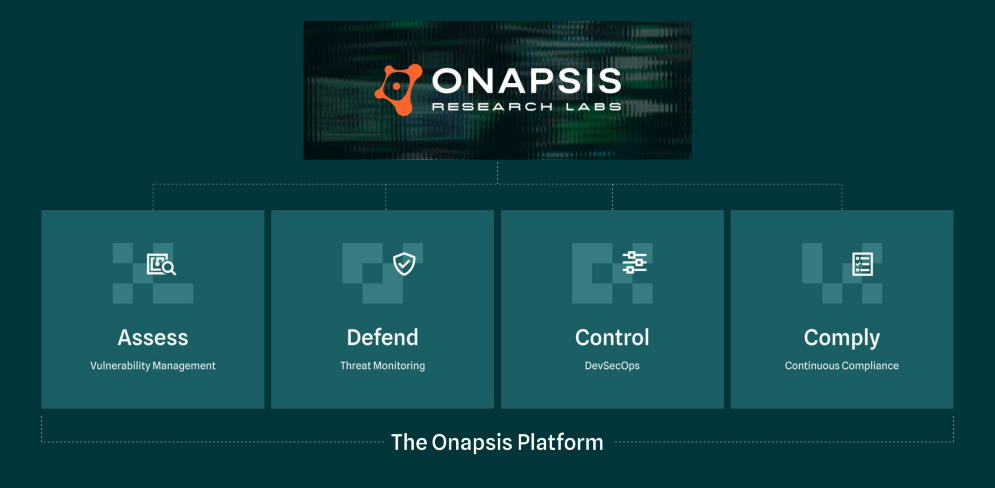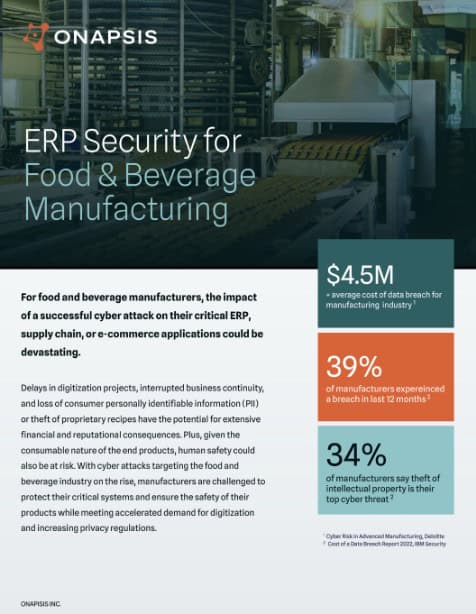For food and beverage manufacturers, the impact of a successful cyber attack on their critical ERP, supply chain, or e-commerce applications could be devastating.
Delays in digitization projects, interrupted business continuity, and loss of consumer personally identifiable information (PII) or theft of proprietary recipes have the potential for extensive financial and reputational consequences. Plus, given the consumable nature of the end products, human safety could also be at risk. With cyber attacks targeting the food and beverage industry on the rise, manufacturers are challenged to protect their critical systems and ensure the safety of their products while meeting accelerated demand for digitization and increasing privacy regulations.
Key Risk Factors
Direct ERP Attacks on the Rise
Cyber attacks targeting the food and beverage industry are on the rise. Successful attacks on ERP systems can be particularly devastating, with the potential to disrupt supply chains, interfere with product safety and delivery, interrupt e-commerce, and result in loss of consumer PII or intellectual property (e.g., product recipes.)
More Digitization and Interconnectivity
COVID-19-induced supply chain instability and shifting consumer expectations are driving a need for more digitization and interconnectivity between business processes and systems, so organizations can be more resilient and respond more quickly to changing supply and demand.
Expanded E-Commerce and Digital Sales
As more food and beverage manufacturers go direct-to-consumer or enhance their e-commerce experiences to address evolving market demand, protecting consumer PII must be top of mind. Failure to do so could result in significant financial loss due to reputation damage or compliance violation (e.g., GDPR, CCPA.)
ERP Security
Security Is Often an Afterthought in Digital Transformation
The need for supply chain digitization and innovative, integrated e-commerce solutions is driving digital transformation at unprecedented speed, often at the sake of security. The tendency has been to “bolt on” security after the fact, which can lead to unaddressed risk, project delays, and cost overruns.
Under-Resourced Teams
Workforce shortages, particularly in cybersecurity, force teams to work harder to balance high-priority digital initiatives with ensuring resiliency and integrity of ERP, e-commerce, and supply chain systems and data. This can be particularly challenging since many security teams lack experience with these systems.
Limited Visibility for Security Teams
Limited or restricted visibility into ERP applications and assets across complex and interconnected landscapes results in unaddressed risk to the systems supporting digital supply chains, e-commerce, and other business-critical operations, as well as limited protection of the data within these systems.

Solution
Onapsis Provides a Better Approach to ERP Security
Fortunately, securing your complex ERP landscape doesn’t have to be complicated, even with all the advanced threats and attacks out in the wild. That’s where Onapsis comes in. As the undisputed experts in business application security with the most prolific threat research team for SAP and Oracle, Onapsis has been on the frontlines securing the world’s leading food and beverage manufacturers for over a decade now. We’re proud to be an Oracle partner and the only application security platform in the SAP Endorsed Apps program. With Onapsis, you get complete 360 degree security for your critical ERP applications, helping you:
- Automate security, so you can avoid delays and audit findings and focus on core transformation tasks, while ensuring your critical systems and data stay protected
- Gain research-driven analysis and focused threat intel from industry experts, so even teams new to ERP can quickly and effectively understand and act on risk
- Integrate with ticketing systems and SIEMs, so ERP can be brought into existing processes and SOC playbooks
Case Study
$10.6B Beverage Manufacturer Builds SAP Vulnerability Management Program, Eliminates Majority of Manual Patching Efforts and Reduces MTTR
Challenge
Manual patching processes and competing priorities resulted in a backlog of SAP Security Notes, leaving critical SAP systems exposed. Internal teams also lacked the visibility and SAP security knowledge to understand and manage their full attack surface.
Solution
With Onapsis, time-saving vulnerability scans eliminated much of the manual work around identifying missing patches and validating they were applied correctly, and provided much-needed visibility into the broader attack surface across complex landscapes. The beverage manufacturer gained a much more accurate understanding of risk within their critical SAP systems, permitting them to make more informed decisions on where and how to respond, resulting in reduced investigation and remediation times and greater risk reduction with much less effort.
Learn more about how Onapsis helps food & beverage manufacturers protect the systems and data supporting their ERP, digital supply chains, product innovation, and other business-critical operations at onapsis.com/fb-manufacturing
Reference
1 Cyber Risk in Advanced Manufacturing, Deloitte
2 Cost of a Data Breach Report 2022, IBM Security

